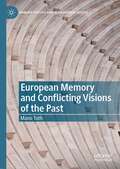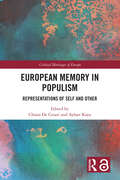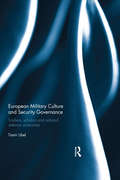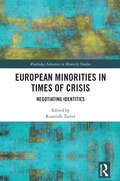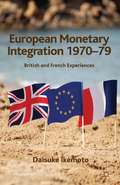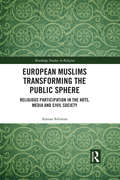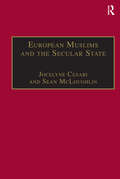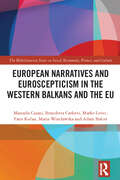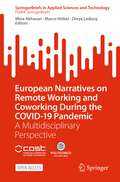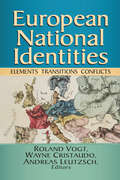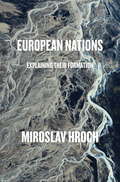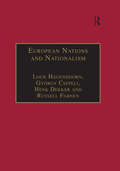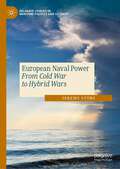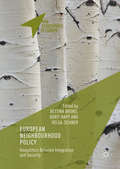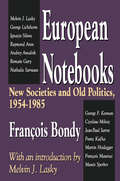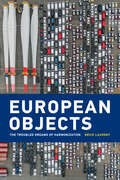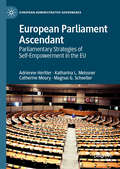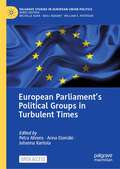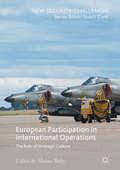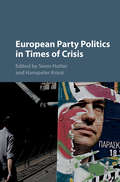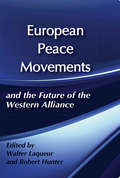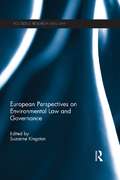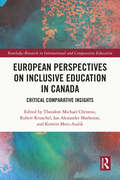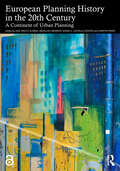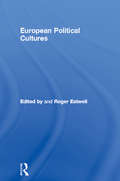- Table View
- List View
European Memory and Conflicting Visions of the Past (Memory Politics and Transitional Justice)
by Mano TothThis book discusses a number of ways in which the dialogue about Europe’s past and future could be rendered more inclusive, such as the promotion of critical and sentimental education and the creation of virtual and actual social spaces in which citizens and organised identity groups can participate. The discussion about European memory is far from being a “merely” symbolic issue with no political consequences. Imagining Europe and its past in different ways will lead to different real political outcomes. For instance, thinking about European integration as an embodiment of the values of the Enlightenment (such as human rights, liberal democracy, and reason), as a guarantor of peace on the continent, as a guarantor of prosperity, or as a guarantor that massive human rights violations like genocide will “never again” be committed on its soil, all entail different political objectives. Similarly, conflicting understandings of European memory as either a thing or a social construct, as either one memory or a plurality of memories, as either the end point of deliberation or a dialogical process, represent not merely inconsequential cultural “froth on the tides of society,” but crucially important issues with real political consequences. The book is intended to contribute to this discussion about the common European approach to the past (and thus to the future).
European Memory in Populism: Representations of Self and Other (Critical Heritages of Europe)
by Ayhan Kaya Chiara De CesariEuropean Memory in Populism explores the links between memory and populism in contemporary Europe. Focusing on circulating ideas of memory, especially European memory, in contemporary populist discourses, the book also analyses populist ideas in sites and practices of remembrance that usually tend to go unnoticed. More broadly, the theoretical heart of the book reflects upon the similarities, differences, and slippages between memory, populism, nationalism, and cultural racism and the ways in which social memory contributes to give substance to various ideas of what constitutes the ‘people’ in populist discourse and beyond. Bringing together a group of political scientists, anthropologists, and cultural and memory studies scholars, the book illuminates the relationship between memory and populism from different angles and in different contexts. The contributors to the volume discuss dominant notions of European heritage that circulate in the public sphere and in political discourse, and consider how the politics of fear relates to such notions of European heritage and identity across and beyond Europe and the European Union. Ultimately, this volume will shed light on how notions of a shared European heritage and memory can be used not only to include and connect Europeans, but also to exclude some of them. Investigating the ways in which nationalist populist forces mobilize the idea of a shared, homogeneous European civilization, European Memory in Populism will be of interest to scholars and students in the fields of European studies, heritage and memory studies, migration studies, anthropology, political science and sociology. Chapters 1, 4, 6, and 10 of this book are freely available as a downloadable Open Access PDF under a Creative Commons Attribution-Non-Commercial-No-Derivatives 4.0 license.
European Military Culture and Security Governance: Soldiers, Scholars and National Defence Universities (Cass Military Studies)
by Tamir LibelThis book offers the first systematic, comparative analysis of military education and training in Europe within the context of the post-Cold War security environment. Based on an analysis of military education institutions in the UK, Germany, Finland, Romania and the Baltic States, this book demonstrates that the convergence of European military cultures since the end of the Cold War is linked to changes in military education. The process of convergence originates, at least in part, from the full or partial adoption of a new concept by post-commissioning professional military education institutions: the National Defence University. Officers are now educated alongside civilians and public servants, wherein they enjoy a socialization experience that is markedly different from that of previous generations of European officers, and is increasingly similar across national borders. In addition, this book argues that with the control over the curricula and graduation criteria increasingly set by civilian higher education authorities, the European armed forces, while continuing to exist, and hold significant (although declining) capabilities, stand to lose their status as a profession in the traditional sense. This book will be of much interest to students of military, European security policy, European politics, and IR in general.
European Minorities in Times of Crisis: Negotiating Identities (Routledge Advances in Minority Studies)
by Ruairidh TarvetOver the last decade, Europe has been struggling to cope with a series of significant and challenging global crises. Dramatic scenes from the so-called migrant crises, global financial crises, the Covid-19 pandemic and the war in Ukraine have sent shockwaves across Europe’s borders and have triggered drastic and sometimes even unprecedented responses from nation states. Caught between the shockwaves and counter-measures are Europe’s national minority communities. With little say or influence in national discussions on which measures to take in response to each crisis and often situated in peripheral or border regions, it is likely that these communities have been subjected to shifts in power balances and this may have even impacted their regional, national and transnational identities. By combining various sociological and anthropological methodologies with case studies from across northern, central, eastern and southern Europe, this book stresses the importance of listening to the unique concerns of minority communities in times of crisis. Starting in the Arctic Circle and working down in a reverse C-shape through Europe, each stop along the journey visits a different national minority community, where we learn about their multicultural, multilingual and transnational lifestyles and the distinct challenges they have faced in recent years. This book will be of interest to academics and researchers working in the areas of human geography, border studies, European studies, sociology, politics, minority studies and language studies.
European Monetary Integration 1970�79
by Daisuke IkemotoThe first systematic analysis of why Britain and France parted company on the issue of European monetary integration. Ikemoto reveals that Britain was much keener to participate in the early stages ofmonetary integration than previously thought; Britain and France pursued broadly similar policies on the issue until the end of the 1970s. "
European Muslims Transforming the Public Sphere: Religious Participation in the Arts, Media and Civil Society (Routledge Studies in Religion)
by Asmaa SolimanAnti-Muslim voices have become louder in many places in the midst of ongoing atrocities undertaken in the name of Islam. As a result, much of the creative participation of Western Muslims in the public sphere has become overshadowed. This tendency is not only visible in political discussions and the media landscape, but it is also often reflected in academia where research about Muslims in the West is predominantly shaped by the post 9/11 narrative. In contrast, European Muslims Transforming the Public Sphere offers a paradigm shift. It puts forward a new approach to understanding minority public engagement, suggesting that we need to go beyond conceptualisations that look at Muslims in the West mainly through the minority lens. By bringing into dialogue minority-specific and non-minority specific concepts, the book offers a relevant complement. Using young German Muslims engaged in media, the arts and culture and civil society as ten case studies, this book utilises the concepts of counterpublics and participatory culture to re-examine Muslims' engagement within the European public sphere. It presents a qualitative analysis, which has resulted from two years of ethnographic fieldwork and participant observation, in-depth interviews and primary source analysis of material produced by the research participants. This book is a unique insight into the outworking of multiculturalism in Western Europe. It illustrates the many-sidedness of young Muslims’ public contributions, revealing how they transform European public spheres in different ways. Therefore, it will be a vital resource for any scholar involved in Islamic Studies, the Sociology of Religion, Religious Studies, Cultural Studies and Media Studies.
European Muslims and the Secular State
by Jocelyne Cesari Seán McLoughlinThe institutionalization of Islam in the West continues to raise many questions for a range of different constituencies. Secularization represents much more than the legal separation of politics and religion in Europe; for important segments of European societies, it has become the cultural norm. Therefore, Muslims' settlement and their claims for the public recognition of Islam have often been perceived as a threat. This volume explores current interactions between Muslims and the more or less secularized public spaces of several European states, assessing the challenges such interactions imply for both Muslims and the societies in which they now live. Divided into three parts, it examines the impact of State-Church relations, 'Islamophobia' and 'the war on terrorism', evaluates the engagement of Muslim leaders with the State and civil society, and reflects on both individual and collective transformations of Muslim religiosity.
European Narratives and Euroscepticism in the Western Balkans and the EU (The Mobilization Series on Social Movements, Protest, and Culture)
by Marko Lovec Manuela Caiani Benedetta Carlotti Maria Wincławska Faris Kočan Adam BalcerMoving from a social movement perspective, this timely volume examines narratives on Euroscepticism and frames on Europe from below, at the party and social movement levels. Revealing perspectives from both the Right and the Left, it unpacks the emergence, re-emergence and increase in critical ‘voices’ and opposition towards Europe.Based on extensive fieldwork in two candidate countries for accession to the EU and three member states, it offers insight from analysis of focus groups, interviews with Eurosceptic and pro-European political actors and ordinary citizens, together with frame analysis and scrutiny of archival material, electoral manifestoes and organisational documents. Revealing the development of Eurocritical frames, it demonstrates the differences and similarities in narratives used to address Europe and the conceptualisation of Euroscepticism. Key cases examined include the rise of illiberalism in post-transition Slovenia; complex Euroscepticism in Poland; the path from strong support to harsh opposition in Italy; indecision over membership in North Macedonia; anticipating the future while revisiting the past in Bosnia and Herzegovina.Offering guidelines for the direction of future research and policy, European Narratives and Euroscepticism in the Western Balkans and the EU is essential reading for scholars and students of political sociology, political science, European studies and international relations, as well as policy makers concerned with trajectories pro and against Europe and the European integration process.
European Narratives on Remote Working and Coworking During the COVID-19 Pandemic: A Multidisciplinary Perspective (SpringerBriefs in Applied Sciences and Technology)
by Mina Akhavan Marco Hölzel Divya LeducqThis open access book offers a multidisciplinary and comprehensive perspective regarding the immediate and long-term effects of the Covid-19 pandemic on coworking spaces in the European Region. The current pandemic has imposed several effects on work and spaces for work. Some are immediate effects and will last for a short time (such as the closing down of the space), some will last longer (namely, the reorganisation of the space to meet the physical distancing), and some will stay for a long time (remote working and hybrid working). Although the literature on coworking spaces and the effects of the pandemic is growing fast, empirical studies are yet limited. Within this context, this book seeks a twofold aim: (i) to contribute to the fast-growing literature on coworking space and their effects at different scales; (ii) to present a multidisciplinary perspective about the effects of the yet-lasting Corona-pandemic effects on the patterns of remote working and consequently on coworking spaces, as the most diffused form of new working spaces.
European National Identities: Elements, Transitions, Conflicts
by ROLAND VOGT, WAYNE CRISTAUDO AND ANDREAS LEUTZSCHMaking sense of the perplexing diversity of Europe is a challenging task. How compatible are national identities in Europe? What makes Europe European? What do Europeans have in common?European National Identities explores the diversity of European states, nations, and peoples. In doing so, the editors focus on the origins and elements of different national identities in Europe and different themes of national self-understanding. Each chapter contributes a unique view of national identities gravitating around myth, historical experiences and traumas, values, ethnic and linguistic differences, and religious fault lines.This work grounds European national identities within cultural, historical, and political dynamics, which makes the work approachable for many readers, including historians, sociologists, and political scientists. In addition, the editors illustrate that national identities continue to be a source of contention and a challenge to political developments, the demands of immigrants and minorities, and the dynamics of European integration. This book draws particular attention to identity shifts and conflicts within individual European countries.
European Nations
by Miroslav Hroch Karolina GrahamOne of the world's leading theorists of nationalism offers a new synthesisIn the history of modern political thought, no topics have attracted as much attention as nationalism, nation-formation, and patriotism. A mass of literature has grown around these vexed issues, muddying the waters, and a level-headed clarification is long overdue.Rather than adding another theory of nationalism to this maelstrom of ideas, Miroslav Hroch has created a remarkable synthesis, integrating apparently competing frameworks into a coherent system that tracks the historical genesis of European nations through the sundry paths of the nation-forming processes of the nineteenth century. Combining a comparative perspective on nation-formation with invaluable theoretical insights, European Nations is essential for anyone who wants to understand the historical roots of Europe's current political crisis.From the Trade Paperback edition.
European Nations and Nationalism: Theoretical and Historical Perspectives (Research in Migration and Ethnic Relations Series)
by Louk Hagendoorn György Csepeli Russell FarnenThis rich source book informs its reader in a comparative perspective about the political and social-economic past and present of fifteen Western, Central and Eastern European countries. This includes the economic and social aspects of the development of the nation state, descriptions of the current political structures and institutions, an account of the types of ethnic composition of the populations, definitions of citizenship and a background to the existing political parties and preferences. The countries involved are: the Russian Federation, Ukraine, Romania, Hungary, Slovakia, the Czech Republic, Poland, Germany, Sweden, The Netherlands, Belgium, Britain, France, Spain and Italy. The authors are scholars in the fields of nationalism and ethnic conflict and they were invited to write their country chapters along the lines of a common format, paying special attention to the notion of state and nation building processes, citizenship definitions and minority issues. This book is a comprehensive reference guide for students and scholars in the fields of social sciences, European studies, history and other related disciplines and generally to those who are interested in the past and present of any one of the large number of countries described.
European Naval Power: From Cold War to Hybrid Wars (Palgrave Studies in Maritime Politics and Security)
by Jeremy StöhsThis book charts new waters in the study of European naval power. It explores the evolution of Europe’s navies from the final days of the Cold War to a period of hybrid wars and renewed strategic competition, manifest in Russia’s invasion of Ukraine and China’s increasingly aggressive behavior in the Asia-Pacific Region. The study compares and contrasts the development of maritime forces across the continent during a period of fundamental change within the global security environment. By applying a novel methodology that links strategies, force structures, and operations, the book determines when, why, and to what degree each navy either continued to focus on competitive and state-centric missions, aimed at the defense of national territory and interests, or rather embraced an entirely new naval paradigm, based on collaborative and system-centric understanding of shared maritime security. The author highlights how inconsistencies and shortsighted naval policies have led to dangerous capability shortfalls and offers several recommendations for navies to navigate successfully the future maritime environment. This book provides an invaluable resource for policymakers, practitioners, scholars, and students interested in European security, transatlantic defense cooperation, and global maritime security issues.
European Neighbourhood Policy
by Bettina Bruns Dorit Happ Helga ZichnerThis book assesses the instruments and measures geared towards determining the EU's relations with it's neighbours. These are channelled on the one hand by the enlargement policy focusing on the Western Balkans and on the other hand by the neighbourhood policy which will enable the integration of Central and Eastern European neighbouring countries without offering membership. Both of these policies have strong local and regional effects in the EU's neighbouring countries. However, little attention has been paid to the perceptions of and impact of these policies in the neighbouring countries themselves. By presenting theoretical contributions and empirical case studies drawing on qualitative and ethnographic fieldwork, this book provides new insights that will be of great interest for students, researchers and practitioners in the fields of Geography, Sociology, Political Science and European Studies.
European Notebooks: New Societies and Old Politics, 1954-1985
by Melvin J. Lasky François BondyA generation of outstanding European thinkers emerged out of the rubble of World War II. It was a group unparalleled in their probing of an age that had produced totalitarianism as a political norm, and the Holocaust as its supreme nightmarish achievement. Figures ranging from George Lichtheim, Ignazio Silone, Raymond Aron, Andrei Amalrik, among many others, found a home in Encounter. None stood taller or saw further than François Bondy of Zurich.In a moving tribute to his friend, Melvin J. Lasky, long- time editor of Encounter, writes, "Bondy was a breathtaking spectacle. I had known him to read and walk, to think and talk, all at once--and still make mental notes for his next article.... Early or late, seated or standing, awake or asleep, his incomparable spiritedness would always be darting from point to point, paying attention and idly wandering at once. Taken all in all, he still continues to represent for me perhaps a Henry Jamesian New Man."Bondy's essays themselves represent a broad sweep of major figures and events in the second half of the twentieth century. His spatial outreach went from Budapest to Tokyo and Paris. His political essays extended from George Kennan to Benito Mussolini. And his prime mÚtier, the cultural figures of Europe, covered Sartre, Kafka, Heidegger and Milosz. The analysis was uniformly fair minded but unstinting in its insights. Taken together, the variegated themes he raised in his work as a Zurich journalist, a Paris editor, and a European homme de letres sketch guidelines for an entrancing portrait of the intellectual as cosmopolitan.European Notebooks contains most of the articles that Bondy (1915-2003) wrote for Encounter under the stewardship of Stephen Spender, Irving Kristol, and then for the thirty years that Melvin Lasky served as editor. Bondy was that rare unattached intellectual, "free of every totalitarian temptation" and, as Lasky notes, unfailing in his devotion to the liberties and civilities of a humane social order. European Notebooks offers a window into a civilization that came to maturity during the period in which these essays were written.
European Objects: The Troubled Dreams of Harmonization (Inside Technology)
by Brice LaurentHow interventions based on objects—including chemicals, financial products, and consumer goods—offer a path to rethink European integration.Interventions based on objects, Brice Laurent claims, have become a dominant path for European policy-making. In European Objects, Laurent analyzes the political consequences of these interventions and their democratization. He uses the term &“European objects&” to describe technical entities that are regulated—and thereby transformed—by European policies. To uncover the bureaucratic and regulatory intricacies of European governance, Laurent focuses on a series of these objects, including food products, chemicals, financial products, consumer goods, drinking water, and occupational environments. Laurent argues that taking European objects seriously offers a way to rephrase the dreams of harmonization and, eventually, rethink the constitutional strength of European integration. Laurent doesn&’t just clarify how European regulation works, but also explores ways to realize long-term objectives for European integration, such as a harmonized market or an objective expertise. Regulation is best understood as &“regulatory machinery&” bringing together various types of legal constraints, material interventions on objects, and the imagining of desirable futures. Analyzing European objects enables Laurent to explore what regulation has become after years of evolution have made it a central component of the European policy world. He offers practical illustrations of how the regulatory machinery functions today. If Europe succeeds at reinventing the terms of its legitimacy with objects that matter for the European publics, it will provide a telling demonstration that the opposition of expertise and populism is not the unavoidable fate of liberal democracies.
European Parliament Ascendant: Parliamentary Strategies of Self-Empowerment in the EU (European Administrative Governance)
by Adrienne Héritier Katharina L. Meissner Magnus G. Schoeller Catherine Moury"If one wants to understand why, from its modest beginnings, the European Parliament has become a major player in EU decision-making, look no further than this book. It presents, to date, the theoretically most compelling, methodologically disciplined and empirically richest account of parliamentary self-empowerment over time, across key functions and policy areas. This volume will be a main point of reference for work on the European Parliament, the dynamics of inter-institutional politics, and EU integration more generally for years to come."—Berthold Rittberger, Professor of International Relations, University of Munich, Germany“Anyone interested in the rise of the European Parliament as a significant actor in the EU should read this book. It offers a fascinating insight into the strategies used by the Parliament to achieve its aims and the conditions for its success or failure. It ranges widely across time and policy areas to give a comprehensive analysis of the Parliament’s changing institutional position.”—Michael Shackleton, Professor of European Institutions, Maastricht University, The Netherlands, and former EP officialThis book analyses the European Parliament’s strategies of self-empowerment over time stretching across cases of new institutional prerogatives as well as substantive policy areas. It considers why and how the Parliament has managed to gain formal and informal powers in this wide variety of cases. The book provides a systematic and comparative analysis of the European Parliament’s formal and informal empowerment in two broad sets of cases: on the one hand, it examines the EP’s empowerment since the Treaty of Rome in three areas that are characteristic of parliamentary democracies, namely legislation, the budget, and the investiture of the executive. On the other hand, it analyses the European Parliament’s role in highly politicised policy areas, namely Economic and Monetary Governance and the shaping of EU trade agreements.
European Parliament’s Political Groups in Turbulent Times (Palgrave Studies in European Union Politics)
by Johanna Kantola Petra Ahrens Anna ElomäkiThis open access book provides the first ever authoritative collection of scholarly insights, based upon original research, into the political groups of the EP tackling the fundamental changes since the Lisbon Treaty and the upsurge of radical right parties. It analyses political groups and their importance from multiple perspectives critically assessing their role and significance in EU politics. Each chapter is authored by leading scholars in the field, working on key topics in relation to political groups: political group formation and function, their role in parliamentary and EU policy-making, the way that Eurosceptic MEPs influence (or not) the Parliament, and the nature and form of interactions with external actors. In doing so, each chapter opens hitherto unexplored ‘black boxes’ in the political work of the EP, such as the internal practices of, and power relations within the political groups, and informal arenas of intra-group decision-making.
European Participation in International Operations
by Malena BritzTaking its departure in the concept of strategic culture, this book answers the question of why European countries decide either to participate or not in international military operations. This volume examines strategic culture and its relation to justifications of decisions made by France, Germany, Greece, Italy, Poland and the United Kingdom, with regard to four different operations: Operation Enduring Freedom/ISAF in Afghanistan, Operation Iraqi Freedom in Iraq, Operation Unified Protector in Libya, and EU Navfor/Atalanta outside Somalia. In this work, the authors closely analyse the role of civil-military relations with regard to decisions about participation. What is the role of the armed forces in the political process leading up to the decision? What is their advisory capacity in shaping the mission? Employing a theoretical framework of strategic culture, including aspects of civil military relations, this innovative volume seeks to answer these questions. This text is essential reading for academics, researchers and students of international relations, foreign policy, war studies or civil-military relations.
European Party Politics in Times of Crisis
by Hanspeter Kriesi Swen HutterThis comprehensive study of party competition in Europe since 2008 aids understanding of the recent, often dramatic, changes taking place in European politics. It addresses how the multiple crises that Europe faces have affected the intensity and structure of party competition, and whether we are seeing a wave of 'critical elections' which will reshape European politics for years to come. The geographical scope of the book covers fifteen European countries, including cases from North-Western Europe (Austria, Britain, France, Germany, Ireland, the Netherlands, and Switzerland), Southern Europe (Greece, Italy, Portugal, and Spain), and Central-Eastern Europe (Hungary, Latvia, Poland, and Romania). Using original data from a large-scale content analysis of mass media, and the debates among parties in election campaigns, this book provides clear graphical presentations of the results, appealing to a wide readership of students, scholars, journalists, practitioners, and the politically interested public.
European Peace Movements and the Future of the Western Alliance
by Walter LaqueurThis extraordinary compendium concerns the future of the Western alliance and the development of the peace movements in Europe and in the United States. The peace movement is an old phenomenon given new life by NATO decisions concerning nuclear deployment in Europe and the Soviet responses along the same lines. After a long postwar marriage, Europeans and Americans alike are reexamining the premises of the Western alliance.The contributors provide a variety of scenarios, extending from the maintenance of the status quo to the complete dismantling of the Western alliance, or at least of its NATO component. In a context of rapid change and new challenges to the democratic bloc, the editors and authors argue for higher levels of economic integration and caution that competition might spill over into political collapse.The work deals with thorny security issues in a frank and policy-oriented way. While each contributor expresses a unique standpoint, a surprising consensus emerges: The need for democratic nations to move toward a higher policy ground in order to preserve the fundamental alliance that led to the postwar consensus to begin with. Some contributors feel this is still possible, others that the time has passed, and that national rather than regional interests will once more prevail.The work contains an extraordinary array of talent from both the American and European perspectives. Among the major contributors and their themes are Henry Kissinger on "A Plan to Reshape NATO"; William G. Hyland on "The European Peace Movement and NATO"; Irving Kristol on "What's Wrong with NATO?"; Theodore Draper on "The Western Misalliance"; Niels Haagerup on "The Nordic Peace Movements"; Martin Ceadel on "The British Nuclear Disarmers"; and Jeffrey Herf on "The SPD and the Peace Movement in West Germany." This is a well-integrated text, with no random essays.
European Perspectives on Environmental Law and Governance (Routledge Research in EU Law)
by Suzanne KingstonThis book provides a range of perspectives on some of the most pressing contemporary challenges in EU environmental law and governance from some of today’s leading European environmental academics and practitioners. The book maintains a focus on three key cross-cutting issues, each of which is carefully analysed through the lens of governance. The first theme to be addressed is that of climate change and the problems it poses for EU governance. The second issue explored concerns the challenge of integrating environmental considerations into other policy areas, as is required by the Treaty on the Functioning of the European Union and the EU’s Charter of Fundamental Rights. Finally, the third theme centres on the important challenge of improving environmental enforcement within the EU, and considers issues such as the Aarhus Convention and the evolution of the Commission’s work on implementation and enforcement throughout the past twenty years. Each of these three themes is situated within the broader ongoing debate about the changing nature of European environmental governance post-Lisbon and the ways in which developments in this area fits within broader trends in European governance theory and policy generally. European Perspectives on Environmental Law and Governance contains contributions from experts in the field including; Mary Robinson, Alan Boyle, Ludwig Kramer and Liam Cashman, and will be of interest to academics, students and practitioners of EU environmental law.
European Perspectives on Inclusive Education in Canada: Critical Comparative Insights (Routledge Research in International and Comparative Education)
by Theodore Michael ChristouFeaturing leading voices in the field from across Canada and Europe, this edited collection offers empirical analyses of the historical, social, cultural, and legislative determinants of inclusive education in Canadian schools. Covering four thematic areas including the structure, culture, and practices of inclusive education, the volume offers comparative insights from a European perspective, engaging critically with widely held views of Canada as a world leader in inclusive education. Providing rich comparisons with educational systems in Germany, Spain, and Finland, chapters explore in-depth the assessment structures and curricula specific to Canada, as well as educational policy, and explore attitudes and practices in relation to diverse student populations, including refugee and indigenous peoples, and students with special educational needs. This volume will benefit researchers, academics, and educators with an interest in multicultural education, international and comparative education, as well as educational policy more specifically. Those involved with inclusion and special educational needs will also benefit from this volume.
European Planning History in the 20th Century: A Continent of Urban Planning
by Max Welch Guerra Abdellah Abarkan Martin Pekár Castrillo Romón, María A. Victoria GrauThe history of Europe in the 20th century is closely tied to the history of urban planning. Social and economic progress but also the brute treatment of people and nature throughout Europe were possible due to the use of urban planning and the other levels of spatial planning. Thereby, planning has constituted itself in Europe as an international subject. Since its emergence, through intense exchange but also competition, despite country differences, planning has developed as a European field of practice and scientific discipline. Planning is here much more than the addition of individual histories; however, historiography has treated this history very selective regarding geography and content. This book searches for an understanding of the historiography of planning in a European dimension. Scholars from Eastern and Western, Southern and Northern Europe address the issues of the public led production of city and the social functions of urban planning in capitalist and state-socialist countries. The examined examples include Poland and USSR, Czech Republic and Slovakia, UK, Netherlands, Germany, France, Portugal and Spain, Italy, and Sweden. The book will be of interest to students and scholars for Urbanism, Urban/Town Planning, Spatial Planning, Spatial Politics, Urban Development, Urban Policies, Planning History and European History of the 20th Century.
European Political Cultures: Conflict Or Convergence?
by Roger EatwellThis comparative study of the political cultures of the major european nations, explores the notion of nationhood as it applies in different political contexts.
